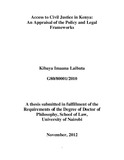Access to civil justice in Kenya: an appraisal of the policy and legal framework.
Abstract
A diverse range of international human rights instruments prescribe minimum standards and
essential elements of equal access to civil justice. Those ratified by Kenya form part of the
municipal law by virtue of Article 2(6) of the Constitution of Kenya (2010). The Constitution
guarantees the right of access to justice and establishes a hierarchy of national tribunals that
exercise judicial authority in the adjudication of competing claims. It forms the foundation for
the extant policy, legal and organisational frameworks for the administration of civil justice.
The threefold purpose of this study is: (a) to conduct an appraisal of the policy and legal
frameworks in Kenya; (b) to evaluate the level of consumer satisfaction in the civil justice
system with particular reference to the principles of proportionality, party autonomy, expedition,
fairness of process, extent and equality of opportunity to access; and (c) to recommend
appropriate policy and legislative reform strategies for expeditious claim adjudication and the
augmentation of equal access to civil justice.
The study establishes that the current Kenya‘s policy and legal frameworks are not well suited to
guarantee the effective delivery of, and equal access to, civil justice, and that the system of
procedural justice is not well suited to deliver quality outcomes and effective remedies. In
response to these inadequacies, the study addresses pertinent conceptual issues and recommends
various reform measures founded on what it considers as the conceptual imperatives for the
efficient delivery of civil justice. The proposed reform strategies draw from beneficial examples
of international best practices and from strategic interventions undertaken in other jurisdictions.

